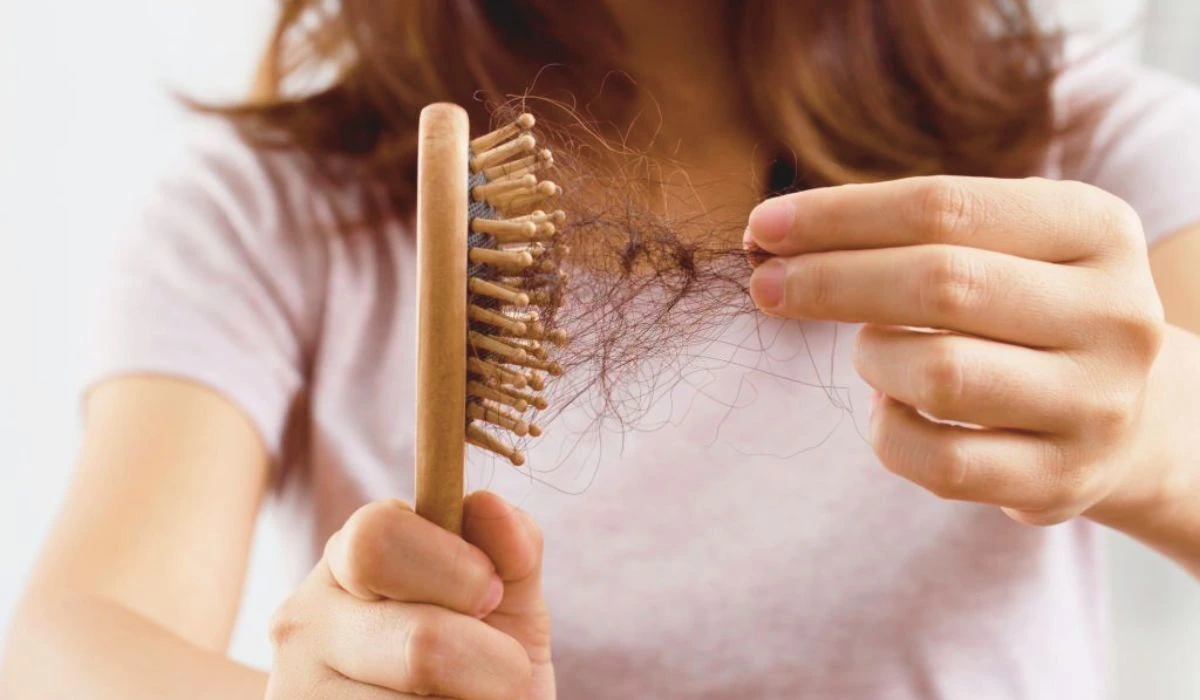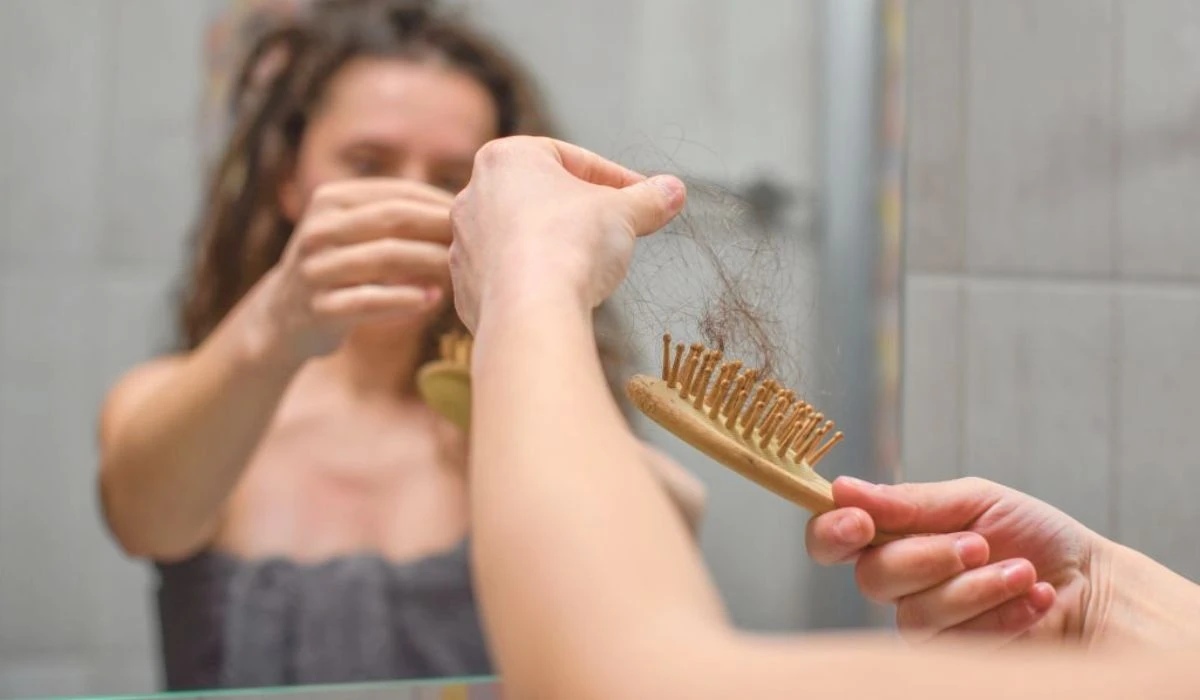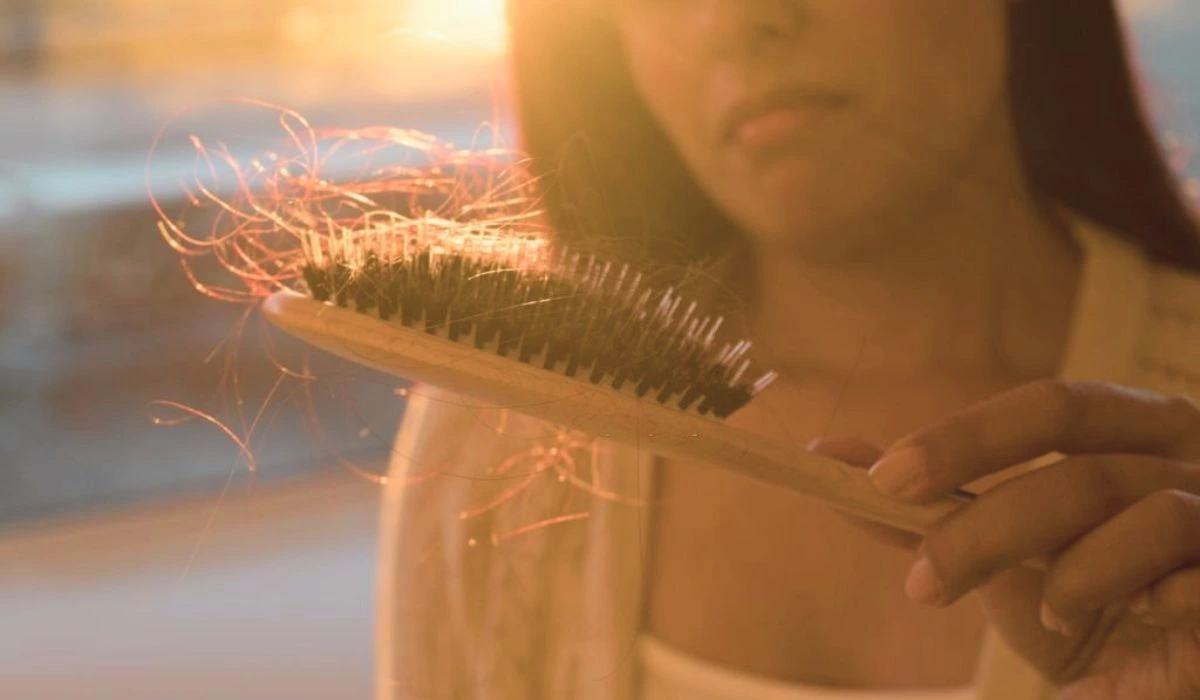Thyroid-induced hair loss can be distressing. Thus, understanding how to prevent it naturally is key. To take control of hair health and reduce the impact, remedies, and lifestyle changes are essential.
Thyroid-induced hair loss is a common condition linked to an underactive or overactive thyroid gland. It can be distressing for men and women. The thyroid regulates the body’s metabolism, including hair growth. When it’s functioning incorrectly, it can disrupt the hair cycle and cause excessive shedding and thinning.
To reduce or prevent hair loss, the underlying issue must be addressed. Seeking medical advice from a healthcare professional is essential to diagnose and manage any thyroid disorders.
Causes And Risk Factors Of Thyroid-Induced Hair Loss
To prevent thyroid-induced hair loss, dive into the causes and risk factors surrounding this issue. Explore the thyroid disorders and hair loss connection, as well as the impact of hormonal imbalance on hair health.

With a comprehensive understanding of these sub-sections, you can find natural remedies to combat hair loss caused by thyroid issues.
? Thyroid Disorders And Hair Loss Connection
Thyroid issues have been connected to hair loss for ages. It can be one of the first signs that something is wrong with our thyroid gland.
This gland, located in the front of our neck, is responsible for metabolism. When it’s not balanced, like in hypothyroidism or hyperthyroidism, it can mess up our usual hair growth cycle.
? Hormonal Imbalance And Hair Loss
Hormonal imbalance is a major cause of hair loss. When the body’s hormones are not in their perfect balance, it can mess up the usual hair growth pattern and result in thinning or excessive shedding. This can happen to both men and women, though it is more common in women.
A big hormone that can contribute to hair loss is DHT (dihydrotestosterone). It is taken from testosterone and attaches itself to the hair follicles, making them shrink and stop producing hairs. This process is called miniaturization and it leads to the thinning of hair and eventually hair loss.
Thyroid hormones and estrogen are also important for keeping healthy hair. An underactive or overactive thyroid gland disrupts the hormone balance and leads to hair loss. Fluctuations in estrogen levels like those during pregnancy or menopause can also cause temporary thinning or shedding of hair.
Stress is another factor that messes with the hormonal balance, causing an increase in cortisol levels. This will lead to more shedding or even alopecia areata, an autoimmune condition.
Signs And Symptoms Of Thyroid-Induced Hair Loss
Hair loss, due to thyroid issues, is a common problem. To help with timely identification and prevention, let’s look at three indicators of thyroid-related hair loss.
- Increased shedding of hair, such as on your pillow, in the shower drain, or on your brush, might indicate an underlying thyroid issue. Be aware of such excessive shedding, so you can take action.
- Changes in the texture and appearance of your hair, such as becoming dry, brittle, and dull, or losing its natural shine and thickness, can also point to thyroid-induced hair loss.
- Thinning of the hair or bald patches may be a strong sign of thyroid-related hair loss, due to hormonal imbalances. It’s important to pay attention to such changes for early detection and effective management.
Natural Remedies To Prevent Hair Loss
To prevent hair loss caused by thyroid issues, turn to natural remedies. Proper nutrition and thyroid health, essential vitamins and minerals for hair growth, herbal treatments and supplements, and stress management techniques offer effective solutions.

✅ Proper Nutrition And Thyroid Health
Nutrition is essential for good thyroid health. The thyroid needs certain nutrients to work correctly. Three main points to remember are:
- Eat iodine-containing foods such as seaweed, seafood, and dairy.
- Make sure to get enough selenium from foods like Brazil nuts, shellfish, and organ meats.
- Eat zinc-rich foods like oysters, beef, pumpkin seeds, and spinach.
✅ Essential Vitamins And Minerals For Hair Growth
Vitamin A is needed to make sebum – an oily stuff that keeps hair moisturized. It also creates new cells for hair growth.
Vitamin E is a powerful antioxidant that stops damage from free radicals. It boosts blood flow to the scalp and helps hair grow.
Iron is needed for thick and fast hair growth. It helps oxygen get to the scalp and helps cells divide.
B vitamins like biotin, niacin, and pantothenic acid aid hair growth. They help break down nutrients and make hair strong.
Zinc is very important to stop hair loss. It works in DNA production and protein synthesis – both help hair growth.
✅ Herbal Treatments And Supplements
Herbal treatments and supplements offer a natural way to battle hair loss. These remedies use plant-based ingredients with centuries of use in traditional medicine. They help promote hair growth, nourish the scalp, and reduce inflammation, all of which fight hair loss.
One popular herbal remedy is saw palmetto extract. From the fruit of a North American palm tree, it contains compounds that restrict an enzyme responsible for converting testosterone into DHT. By reducing DHT, saw palmetto prevents follicle shrinkage and stimulates hair growth.
Aloe vera gel is another great remedy. It’s soothing and moisturizing, reducing inflammation, itching, and redness due to conditions like dandruff or psoriasis. This promotes healthy hair growth.
Rosemary oil has been used for ages to promote hair growth. It increases blood circulation in the scalp, stimulating hair follicles and delivering more nutrients. This revitalizes dormant follicles and encourages new hair growth.
Adding essential oils like lavender or peppermint to shampoo or conditioner provides additional benefits. Lavender oil has antimicrobial properties to keep the scalp clean and prevent infections that cause hair loss. Peppermint oil similarly boosts blood circulation, plus it offers a cooling sensation on the scalp for an enjoyable experience.
✅ Stress Management Techniques
Stress wreaks havoc on us, and our hair’s no exception. To prevent hair loss, we need to practice Stress Management Techniques. Deep breathing exercises help calm the mind, and meditation promotes relaxation.
Get physical with yoga or Pilates to release tension and endorphin boost. Find healthy outlets for stress like hobbies, journaling, and time with loved ones. Prioritize self-care with sleep, balanced meals, and limiting caffeine and alcohol. Seeking support from a therapist or counselor could be beneficial too.
A positive outlook and regular stress-relieving practices can benefit your health and hair growth. Don’t let stress take away your beautiful locks – take charge now! Start practicing Stress Management Techniques today for healthier tresses. Give your hair the same care as the rest of your body.
Hair Care Tips For Thyroid-Induced Hair Loss
To combat thyroid-induced hair loss, incorporate these hair care tips into your routine: Follow a gentle hair care routine, avoid heat and chemical damage, and implement styling tips for thinning hair. Prioritizing these sub-sections will help you prevent further hair loss and promote healthier hair growth naturally.
? Gentle Hair Care Routine
When dealing with thyroid-induced hair loss, a gentle hair care routine is important. Practicing specific steps can help promote healthy hair growth and reduce damage.
- Choose mild, sulfate-free shampoos.
- Use a wide-toothed comb or a brush with soft bristles for detangling.
- Also, avoid excessive heat styling.
- When wet, handle your hair with care.
- For extra strengthening, incorporate protein-based treatments into your routine. This can fortify the hair shaft and improve resilience.
? Avoiding Heat And Chemical Damage
- Limit heat styling. Use low-temperature tools, and air-dry when possible.
- Choose gentle hair products. Look for sulfate-free, paraben-free, and alcohol-free options.
- Protect from the sun. Wear a hat or use a protective spray with SPF.
- Avoid harsh coloring treatments. Opt for highlights or temporary dyes.
Also, it’s important to eat healthy, with vitamins A, C, E, and Biotin. And get regular trims to prevent breakage.

